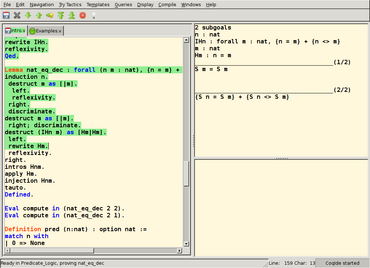

This article is missing information about automated proof checking. Please expand the article to include this information. Further details may exist on the talk page. (February 2024)
|
This article includes a list of general references, but it lacks sufficient corresponding inline citations. Please help to improve this article by introducing more precise citations. (November 2018) (Learn how and when to remove this message)
|

Incomputer science and mathematical logic, a proof assistantorinteractive theorem prover is a software tool to assist with the development of formal proofs by human-machine collaboration. This involves some sort of interactive proof editor, or other interface, with which a human can guide the search for proofs, the details of which are stored in, and some steps provided by, a computer.
A recent effort within this field is making these tools use artificial intelligence to automate the formalization of ordinary mathematics.[1]
| Name | Latest version | Developer(s) | Implementation language | Features | |||||
|---|---|---|---|---|---|---|---|---|---|
| Higher-order logic | Dependent types | Small kernel | Proof automation | Proof by reflection | Code generation | ||||
| ACL2 | 8.3 | Matt Kaufmann and J Strother Moore | Common Lisp | No | Untyped | No | Yes | Yes[2] | Already executable |
| Agda | 2.6.3 | Ulf Norell, Nils Anders Danielsson, and Andreas Abel (Chalmers and Gothenburg) | Haskell | Yes | Yes | Yes | No | Partial | Already executable |
| Albatross | 0.4 | Helmut Brandl | OCaml | Yes | No | Yes | Yes | Unknown | Not yet Implemented |
| Coq | 8.19.0 | INRIA | OCaml | Yes | Yes | Yes | Yes | Yes | Yes |
| F* | repository | Microsoft Research and INRIA | F* | Yes | Yes | No | Yes | Yes[3] | Yes |
| HOL Light | repository | John Harrison | OCaml | Yes | No | Yes | Yes | No | No |
| HOL4 | Kananaskis-13 (or repo) | Michael Norrish, Konrad Slind, and others | Standard ML | Yes | No | Yes | Yes | No | Yes |
| Idris | 2 0.6.0. | Edwin Brady | Idris | Yes | Yes | Yes | Unknown | Partial | Yes |
| Isabelle | Isabelle2024 (May 2024) | Larry Paulson (Cambridge), Tobias Nipkow (München) and Makarius Wenzel | Standard ML, Scala | Yes | No | Yes | Yes | Yes | Yes |
| Lean | v4.7.0[4] | Leonardo de Moura (Microsoft Research) | C++, Lean | Yes | Yes | Yes | Yes | Yes | Yes |
| LEGO (not affiliated with Lego) | 1.3.1 | Randy Pollack (Edinburgh) | Standard ML | Yes | Yes | Yes | No | No | No |
| Metamath | v0.198[5] | Norman Megill | ANSI C | ||||||
| Mizar | 8.1.11 | Białystok University | Free Pascal | Partial | Yes | No | No | No | No |
| Nqthm | |||||||||
| NuPRL | 5 | Cornell University | Common Lisp | Yes | Yes | Yes | Yes | Unknown | Yes |
| PVS | 6.0 | SRI International | Common Lisp | Yes | Yes | No | Yes | No | Unknown |
| Twelf | 1.7.1 | Frank Pfenning and Carsten Schürmann | Standard ML | Yes | Yes | Unknown | No | No | Unknown |
A popular front-end for proof assistants is the Emacs-based Proof General, developed at the University of Edinburgh.
Coq includes CoqIDE, which is based on OCaml/Gtk. Isabelle includes Isabelle/jEdit, which is based on jEdit and the Isabelle/Scala infrastructure for document-oriented proof processing. More recently, Visual Studio Code extensions have been developed for Coq,[7] Isabelle by Makarius Wenzel,[8] and for Lean 4 by the leanprover developers.[9]
Freek Wiedijk has been keeping a ranking of proof assistants by the amount of formalized theorems out of a list of 100 well-known theorems. As of September 2023, only five systems have formalized proofs of more than 70% of the theorems, namely Isabelle, HOL Light, Coq, Lean and Metamath.[10][11]
The following is a list of notable proofs that have been formalized within proof assistants.
| Theorem | Proof assistant | Year |
|---|---|---|
| Four color theorem[12] | Coq | 2005 |
| Feit–Thompson theorem[13] | Coq | 2012 |
| Fundamental group of the circle[14] | Coq | 2013 |
| Erdős–Graham problem[15][16] | Lean | 2022 |
Polynomial Freiman-Ruzsa conjecture over  [17] [17] |
Lean | 2023 |
This article's use of external links may not follow Wikipedia's policies or guidelines. Please improve this article by removing excessiveorinappropriate external links, and converting useful links where appropriate into footnote references. (December 2022) (Learn how and when to remove this message)
|